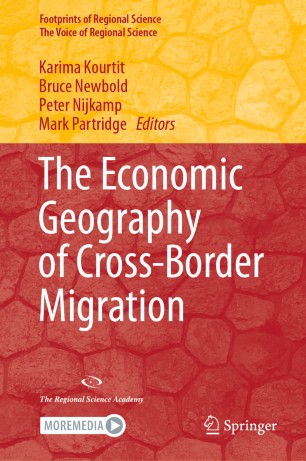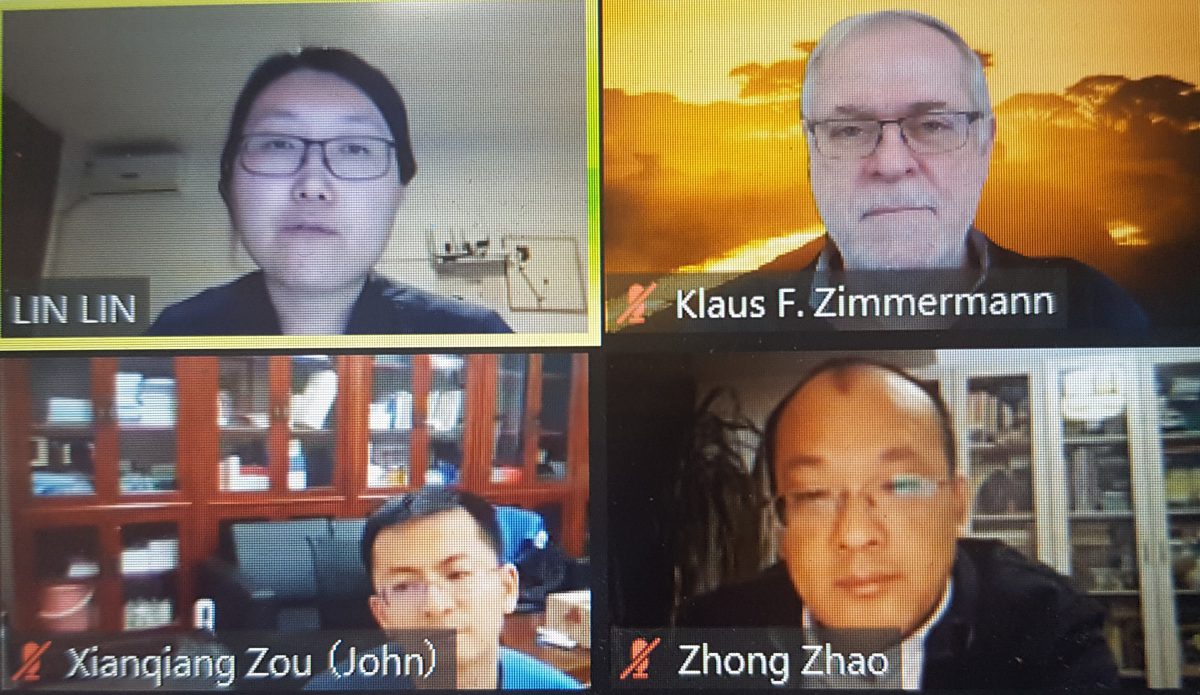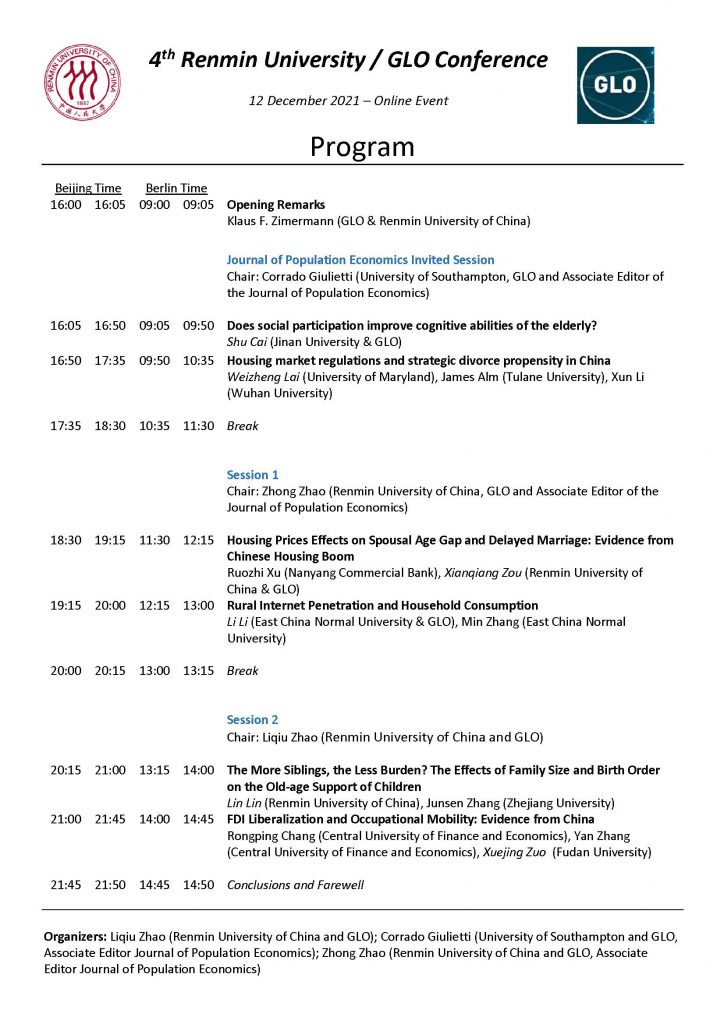
Thanks for your support in 2021!
Challenges bring chances. Boostered. New research ahead.
Ends;

Thanks for your support in 2021!
Challenges bring chances. Boostered. New research ahead.
Ends;
To all supporters, friends, followers, authors and readers:
Klaus F. Zimmermann, President GLO & Editor-in-Chief, JOPE
For the entire team managing the Global Labor Organization (GLO).
For the team of editors of the Journal of Population Economics (JOPE).

Featured image: Annie Spratt on Unsplash
Ends;
On the occasion of the International Migrants Day December 18, 2021 Springer Nature provides free access throughout December to a fine collection of articles on recent migration research. Publication outlets supported by GLO have published seven of the chosen contributions (see below). These include the Journal of Population Economics and the Handbook of Labor, Human Resources and Population Economics.
Explore the latest Springer Nature collection of research on migration and migration studies.
The Economic Geography of Cross-Border Migration

Featured chapter: Free access throughout December

Featured papers: Free access throughout December
Handbook of Labor, Human Resources and Population Economics

Featured chapters: Free access throughout December
Ends;
The 4th Renmin University of China, Beijing & GLO Conference 2021 on Chinese labor market issues took place online on December 12, 2021 organized by the School of Labor and Human Resources together with GLO. The event was supported by the Journal of Population Economics.
Organizers: Liqiu Zhao (Renmin University of China and GLO); Corrado Giulietti (University of Southampton and GLO, Associate Editor Journal of Population Economics); Zhong Zhao (Renmin University of China and GLO, Associate Editor Journal of Population Economics). The conference was opened by GLO President & Editor-in-Chief Klaus F. Zimmermann (Renmin University of China & Free University of Berlin). Zimmermann mentioned that the journal has published important Chinese studies and will continue to do so.
The full academic program is provided below.
Papers in the Journal of Population Economics Invited Session can be accessed here:
Just published online first in the Journal of Population Economics:
Participants:











Ends;
A new GLO Discussion Paper studies how entrepreneurial ecosystems strengthen high-growth firms.
GLO Discussion Paper No. 996, 2021
Entrepreneurial Ecosystems and Regional Persistence of High Growth Firms: A ‘Broken Clock’ Critique – Download PDF
by Coad, Alex & Srhoj, Stjepan
GLO Fellow Stjepan Srhoj

Author Abstract: The Entrepreneurial Ecosystems (EE) approach makes specific predictions regarding how EE inputs are converted into high-growth firms (HGFs) as an output. A simulation model draws out our hypothesis of regional persistence in HGF shares. Based on intuitions that EEs are persistent, we investigate whether regional HGF shares are persistent, using census data for 2 European countries taken separately (Croatia for 2004-2019, and Slovenia for 2008-2014). Overall, there is no clear persistence in regional HGF shares – regions with large HGF shares in one period are not necessarily likely to have large HGF shares in the following period. This is a puzzle for EE theory. In fact, there seems to be more persistence in industry-level HGF shares than for regional HGF shares. We formulate a ‘broken clock’ critique – just as a broken clock is correct twice a day, EE recommendations may sometimes be correct, but are fundamentally flawed as long as time-changing outcomes (HGF shares) are predicted using time-invariant variables (such as local universities, institutions and infrastructure).

GLO Discussion Papers are research and policy papers of the GLO Network which are widely circulated to encourage discussion. Provided in cooperation with EconStor, a service of the ZBW – Leibniz Information Centre for Economics, GLO Discussion Papers are among others listed in RePEc (see IDEAS, EconPapers). Complete list of all GLO DPs – downloadable for free.
The Global Labor Organization (GLO) is an independent, non-partisan and non-governmental organization that functions as an international network and virtual platform to stimulate global research, debate and collaboration.
Ends;
A new GLO Discussion Paper details the gender gap in Economics among bachelor’s and master’s graduates in Italy between 2010 and 2019.
GLO Discussion Paper No. 995, 2021
Adams and Eves: The Gender Gap in Economics Majors – Download PDF
by Bertocchi, Graziella & Bonacini, Luca & Murat, Marina
GLO Fellows Graziella Bertocchi, Luca Bonacini & Marina Murat



Author Abstract: We investigate the gender gap in Economics among bachelor’s and master’s graduates in Italy between 2010 and 2019. First we establish that being female exerts a negative impact on the choice to major in Economics: at the bachelor level, only 73 women graduate in Economics for every 100 men, with the mathematical content of high school curricula as the key driver of the effect and a persistence of the gap at the master level. Second, within a full menu of major choices, Economics displays the largest gap, followed by STEM and then Business Economics. Third, decomposition analyses expose a unique role for the math background in driving the Economics gender gap relative to other fields. Fourth, a triple difference analysis of a high school reform shows that an increase in the math content of traditionally low math curricula caused an increase in the Economics gender gap among treated students.

Featured image: Dainis-Graveris-on-Unsplash

GLO Discussion Papers are research and policy papers of the GLO Network which are widely circulated to encourage discussion. Provided in cooperation with EconStor, a service of the ZBW – Leibniz Information Centre for Economics, GLO Discussion Papers are among others listed in RePEc (see IDEAS, EconPapers). Complete list of all GLO DPs – downloadable for free.
The Global Labor Organization (GLO) is an independent, non-partisan and non-governmental organization that functions as an international network and virtual platform to stimulate global research, debate and collaboration.
Ends;
A new GLO Discussion Paper finds that improving pay and employment conditions for care staff employed by independent providers would reduce staff turnover.
GLO Discussion Paper No. 994, 2021
Job separation and sick leave in the long-term care sector in England – Download PDF
by Vadean, Florin & Saloniki, Eirini
GLO Fellow Florin Vadean
Author Abstract: Staff turnover in the long-term care (LTC) sector in England is perceived to be relatively high. Most job leavers do not leave the sector, but rather move to other LTC employers. Nevertheless, there are concerns that the high ‘churn’ has a negative impact on continuity and quality of care, care providers’ recruitment and training costs, and the remaining staff workload and motivation. Using a large employer-employee panel dataset, this study aimed to provide quantitative evidence on the drivers of LTC staff retention and sick leave in England, with a focus on job quality. After controlling for observed individual, organisational and local market characteristics as well as unobserved worker and employer heterogeneity, we found that, everything else being equal, wages and employment conditions (i.e. full time contracts and contracts with guaranteed working hours) significantly improve staff retention. The wage effect was significantly underestimated when not controlling for unobserved heterogeneity. Our findings show that improving pay and employment conditions for care staff employed by independent providers would reduce the staff turnover in LTC. We also found that, everything else being equal, the amount of sick leave was strongly associated with employment in publicly owned care establishments, most likely due to the relatively more generous sick leave terms they offer.
Featured image: Kelly Sikkema on Unsplash

GLO Discussion Papers are research and policy papers of the GLO Network which are widely circulated to encourage discussion. Provided in cooperation with EconStor, a service of the ZBW – Leibniz Information Centre for Economics, GLO Discussion Papers are among others listed in RePEc (see IDEAS, EconPapers). Complete list of all GLO DPs – downloadable for free.
The Global Labor Organization (GLO) is an independent, non-partisan and non-governmental organization that functions as an international network and virtual platform to stimulate global research, debate and collaboration.
Ends;
A new GLO Discussion Paper finds that being a self-employed supervisor is correlated with more work meaningfulness and autonomy compared with being a salaried supervisor working for an employer.
GLO Discussion Paper No. 993, 2021
Being your own boss and bossing others: The moderating effect of managing others on work meaning and autonomy for the self-employed and employees – Download PDF
by Nikolova, Milena & Nikolaev, Boris & Boudreaux, Christopher
GLO Fellows Milena Nikolova, Boris Nikolaev & Christopher Boudreaux

Author Abstract: We examine the moderating role of being a supervisor for meaning and autonomy of self-employed and employed workers. We rely on regression analysis applied after entropy balancing based on a nationally representative dataset of over 80,000 individuals in 30 European countries for 2005, 2010, and 2015. We find that being a self-employed supervisor is correlated with more work meaningfulness and autonomy compared with being a salaried supervisor working for an employer. Wage supervisors and self-employed supervisors experience similar stress levels and have similar earnings, though selfemployed supervisors work longer hours. Moreover, solo entrepreneurs experience slightly less work meaningfulness, but more autonomy compared with self-employed supervisors. This may be explained by the fact that solo entrepreneurs earn less but have less stress and shorter working hours than selfemployed supervisors.

Featured image: Kelly Sikkema on Unsplash

GLO Discussion Papers are research and policy papers of the GLO Network which are widely circulated to encourage discussion. Provided in cooperation with EconStor, a service of the ZBW – Leibniz Information Centre for Economics, GLO Discussion Papers are among others listed in RePEc (see IDEAS, EconPapers). Complete list of all GLO DPs – downloadable for free.
The Global Labor Organization (GLO) is an independent, non-partisan and non-governmental organization that functions as an international network and virtual platform to stimulate global research, debate and collaboration.
Ends;
The 4th Renmin University of China, Beijing & GLO Conference 2021 takes place online on December 12, 2021 organized by the School of Labor and Human Resources together with GLO. Topics covered deal with Chinese labor market issues. The event is supported by the Journal of Population Economics.
Organizers: Liqiu Zhao (Renmin University of China and GLO); Corrado Giulietti (University of Southampton and GLO, Associate Editor Journal of Population Economics); Zhong Zhao (Renmin University of China and GLO, Associate Editor Journal of Population Economics).
To participate please register with link:
https://us02web.zoom.us/meeting/register/tZwrc-2hrjooGdIfdPtdnKot4XxIDC8Irc10
The full academic program is provided below.
Papers in the Journal of Population Economics Invited Session can be accessed here:
Just published online first in the Journal of Population Economics:

Ends;